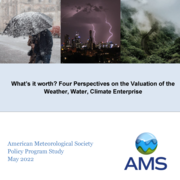Earth system observations, science, and services (OSS) inform and guide the activities of virtually every economic sector and innumerable institutions underlying modern civilization. OSS are a fundamental component of efforts to meet basic human needs including food, shelter, energy, health and safety. At the same time, opportunities to enhance the societal benefits of OSS are vast and increasing. Better understanding of the weather, water, and climate (WWC) enterprise’s value could: create new opportunities to apply OSS for societal benefit; help justify public investments in OSS; and guide future investments in OSS to help ensure that they confer the maximum possible benefit to society. As a result, there is great need for efforts to understand, assess, communicate, and advance the value of OSS.
This study synthesizes the results of a multi-year project on the valuation of Earth system OSS. The conclusions are based on four studies relating to different aspects of the societal benefits of Earth system OSS: 1) Societal Benefits of Weather, Water, and Climate: Understanding, Communication, and Enhancement (bit.ly/sbwxc), 2) The Value Chain of Earth System Observations, Science, and Services (bit.ly/3uAHjXG), 3) Three Policies Shape Enterprise Value: Minor Adjustments Could Enhance the Societal Benefit (https://bit.ly/3Wxpolicies) and 4) Options for Enhancing the Value of the NOAA Weather-Ready Nation Ambassador Initiative (https://bit.ly/30qRnY1).
Key Overarching Findings:
1) Valuation efforts promote societal benefit by: a) Enabling decision-making, b) Allowing prioritization, c) Improving investment decisions, and d) Promoting the use of science and services.
2) Assessments of value depend on both complex factors and subjective choices (e.g. how we measure value, how decisions incorporate and weight information, and what information is considered).
3) Valuation clarifies options and makes comparisons more effective. Valuation efforts are most effective in comparing different options and identifying their relative strengths and weaknesses with respect to explicit assumptions and metrics, instead of trying to determine absolute values.
4) The value of the WWC enterprise has increased with the number of partnerships across sectors and in all phases of the value chain. It has made valuation efforts more complex.
5) One key limitation to valuation efforts is the difficulty to collect and research data on end users and their decision-making based on WWC products. These decisions ultimately realize much of the enterprise’s value.
6) Effective methods to advance the value of the WWC enterprise are likely to build on adaptive responses to incremental changes whose effectiveness can be determined quickly and lessons learned disseminated broadly.
7) Partnerships and effective distributions of roles and responsibilities among public, private, academic, and NGO communities are crucial and must evolve over time as capabilities, conditions, opportunities, and interests shift. These partnerships require and promote understanding, respect, trust, and clarity with respect to roles, responsibilities, and rules of engagement.
Valuation is critical to decision making at all levels. The set of studies synthesized here can contribute to a common understanding how value can be enhanced and communicated within and outside of the weather, water, and climate enterprise. There are many opportunities to build on this work. One option is to explicitly include a larger number of stakeholders and partners and analyze value creation along the value chain and across sectors and agencies.
There are also new approaches to expand on the work in this program. It is likely that the value of weather, water, and climate intelligence varies between different sectors of the economy. A study that compares different sectors could lead to important insights about synergies and offsets in the WWC enterprise.
Finally, climate change and society’s response to it is likely to have significant impacts on the investments and values created (and expected) in weather, water, and climate science. There is a need for socioeconomic assessments to define and communicate priorities as the US and the world prepare for decades of rapid transformation. In particular, renewed economic activity on the coasts and in the ocean (“the new blue economy”), and the ongoing national conversation about the delivery of climate services are great opportunities to use valuation in an effort to grow the WWC enterprise and serve society as effectively as possible.
The AMS Policy Program has established an interdisciplinary team to build on the results of this project and develop a proposal for a consortium for socioeconomic assessments of the WWC enterprise. This program would enable AMS to continue its internal work on valuation as well as funding external experts to advance our understanding and communication of Earth system OSS.
